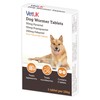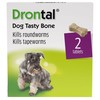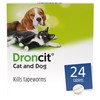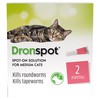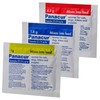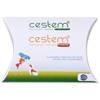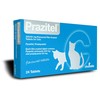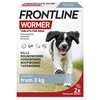Dog Worming & Cat Worming
Worming Treatments for Dogs and Cats are vital for preventing and controlling internal parasite infestations that can cause serious health issues for your pet. It is not always obvious when your pet has worms, so it is important to follow a regular worming schedule with an effective wormer to help treat and prevent infestation, alleviate discomfort, and safeguard their health and wellbeing.
Designed to eliminate worms at different stages of their lifecycle, including adult worms and larvae, our range of carefully selected products are available in various forms including tablets, spot-on treatments, and a liquid oral solution for puppies.
Dog worms in the UK are two main types of worm: Roundworms and Tapeworm. These internal parasites each settle in different organs of body systems producing a wide variety of symptoms of differing degrees of severity. Early recognition of the symptoms is important both to provide swift treatment avoiding acute and sometimes life-threatening complications and also to prevent the transmission of worms between dogs – and even from dogs to humans.
Most worms infestations in dogs can cause any of the following symptoms with varying degrees of severity: diarrhoea; weight loss; vomiting; appetite loss or sometimes appetite gain; dull, dry coat; coughing; debilitation and general poor appearance. However these symptoms are not always caused by worms and can be a sign of a more serious problem.
Roundworms are the most common and often affect puppies under six months of age. The two types, Toxocara canis and Toxascaris leonine, are both whitish worms up to 10 cm long. The adult worms live in the small intestine where they reproduce releasing eggs into the environment in the faeces of the affected dog. It is during this stage that roundworms cause intestinal symptoms such as diarrhoea, vomiting (sometimes with worms in the vomit), extension of the abdominal wall (so called “barrel belly”) and growth delay in puppies. While Toxascaris leonina spends its whole lifecycle within the dog’s intestine the first larval stages of Toxocara canis live in the respiratory tract that can cause parasitic pneumonia and respiratory symptoms. The larvae of Toxocara canis can migrate to different body tissues and organs where they enter a dormant state until they are reactivated during pregnancy and are transmitted directly to the foetus or, after the delivery, to the newborn puppies through maternal milk often affecting all the puppies of a litter at the same time.
Tapeworms (Dipylidium caninum) are thin whitish worms, up to 50 cm long, that live in the small intestine of dogs. They usually do not cause any symptoms, except for itching at the perianal area and, in case of severe infestation, diarrhoea, abdominal pain and weight loss. However, the typical sign of infestation in dogs (whether mild or severe) is the excessive licking of the area around the anus. This is the alarm bell that should lead dog owners to seek treatment for their pets. It is also important to note that tapeworms are transmitted to dogs through the ingestion of fleas carrying the infective larval stage of Dipylidium caninum. Anti-tapeworm therapy should be always associated with measures of control and treatment of flea infestations.
Symptoms of worms in dogs are fairly characteristic, although not specific for worm infestation, so they should always require a confirmation for a positive diagnosis through appropriate examinations. This is especially important considering that infestations with different types of dog worms usually require different forms of treatment.
